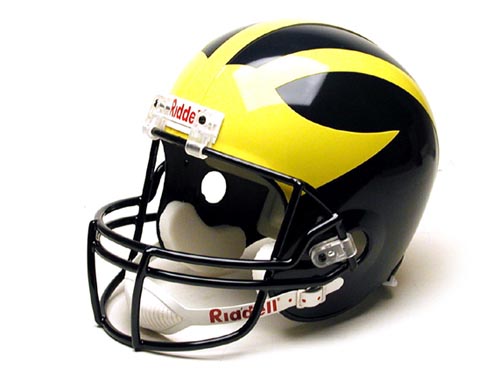September 14, 2007
ANN ARBOR, Mich. -- One comment changed the course of my week and opened my eyes to the story behind the Michigan-Notre Dame rivalry.
I have Michigan coach Lloyd Carr to thank.
During the football team's weekly press conference, a reporter asked Carr what made the rivalry special for the coach, who's been a part of more than half of the games the two teams have played against each other (13 as an assistant, eight as a head coach).
Carr's response was memorable.
"This guy, John Kryk, who I think has written a wonderful history of the Notre Dame-Michigan game, I recommend you find his book and read it," Carr said with a hint of sarcasm.
Lloyd was probably just trying to muster a few laughs. I took him seriously and read it.
I found the Kryk's chronicle "Natural Enemies" at Barnes & Nobles and settled into a cushioned chair to skim the 298 pages for an hour (I'm a college student -- I don't read what's not required).
And wouldn't you know it, Carr was right. I learned exactly what went into one of the oldest college football rivalries.
Here's a recap.
Michigan taught Notre Dame how to play the game. Seriously.
The Wolverine players took a train to South Bend, Ind., on Nov. 23, 1887, offered some individual instruction sessions, won 8-0 and then hopped back on a train to go play in Chicago.
George DeHaven, a member of the Michigan team who was instrumental in setting up the game, put it best.
"We played gently with them that day."
From that point, Notre Dame always looked to Michigan as an icon. The problem was, the Wolverines didn't feel the same way.
In 1910, Michigan coach Fielding Yost wanted to cancel the game after Notre Dame won the year before. Yost complained the Fighting Irish didn't adhere to the Western Conference rules by playing freshman and students who had already used their eligibility.
Kryk describes the Michigan mindset as an older brother who felt the Fighting Irish shouldn't always get to hang out with the older crowd.
It probably didn't help that the Notre Dame coach in 1909 was Frank "Shorty" Longman, who had played fullback for Yost at Michigan. Longman lived in Ann Arbor, Mich., at the time and made every effort to brag about the win.
The series didn't resume until 1942 after a 32-year hiatus, and it stopped a year later. In 1943, No. 1 Notre Dame beat No. 2 Michigan, and the series was cancelled again.
The two storied programs didn't return to the same gridiron again until 1978, 35 years later. The Wolverines won 28-14.
The annual matchup became a fixture after 1978, and many of them were named after a game-changing play. There was the Miracle Field Goal (1980), Rocket's Returns (1989), the Catch (1991) and the Tie (1992).
One of the most interesting stories surfaced in the 1985 game. Michigan coach Bo Schembechler had come off a 6-6 season and hadn't won 10 games in four straight years. Kryk said critics questioned whether the game had passed Bo by. Hmm. Sounds familiar.
Michigan, quarterbacked by Jim Harbaugh, won 20-12, and Schembechler led that year's squad to a 10-1-1 record, including a win over Ohio State.
Maybe Carr's thinking this year's Notre Dame game can have a similar effect on his team.
Back to the history. Michigan leads the all-time series 19-14-1, but since the rivalry resumed in 1978, Notre Dame leads 12-10-1.
Throughout the years and the squabbles, Notre Dame continued and the Wolverines were always the one at a distance. Schembechler even said he won't put the Golden Domers on the schedule "if they got down on their hands and knees and begged ... to hell with Notre Dame."
The controversy is still strong. The latest episode developed this summer. Notre Dame athletic director Kevin White said the Fighting Irish would play Oklahoma in place of Michigan when the Fighting Irish's contract with the Wolverines expired after 2011.
The two teams quieted the media storm. The historical rivalry is supposed to go through 2031, but who really knows what will happen.
So maybe Carr wasn't just joking when he told the media to read the book. It just might take 298 pages to explain the rivalry.

No comments:
Post a Comment